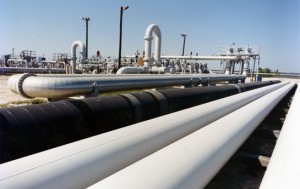 The U.S. currently maintains one of the world’s largest stockpiles of government owned oil, the Strategic Petroleum Reserve (SPR). In response to the 1970s oil embargo and supply shocks, the U.S. created the SPR to ensure access to oil in the event of a severe energy supply interruption. The current SPR consists of four storage sites, housing 694 million barrels of oil that is equivalent to at least 90 days of net oil imports. The SPR has only been tapped three times, but the recent budget deal provides that the government sell 58 million barrels of oil to fund a portion of the $80 billion in new spending outlined in the budget.
The U.S. currently maintains one of the world’s largest stockpiles of government owned oil, the Strategic Petroleum Reserve (SPR). In response to the 1970s oil embargo and supply shocks, the U.S. created the SPR to ensure access to oil in the event of a severe energy supply interruption. The current SPR consists of four storage sites, housing 694 million barrels of oil that is equivalent to at least 90 days of net oil imports. The SPR has only been tapped three times, but the recent budget deal provides that the government sell 58 million barrels of oil to fund a portion of the $80 billion in new spending outlined in the budget.
This is not the first time the SPR has been suggested as a source of revenue for new spending. Earlier this year, the 21st Century Cures Act, which passed the House, proposed the sale of 80 million barrels of oil to raise funds for drug research, and the FAST Act, (originally titled the DRIVE Act) which passed both the House and Senate, would sell 66 million barrels to pay for highway infrastructure.
There are conflicting views on whether the U.S. should sell none, all or a portion of the SPR. Some believe the federal government should only use revenue from SPR sales to fund improvements to national energy security, while others say the SPR should remain untouched because they view it as vital for our economy. On the other hand, SPR critics argue that the SPR is unnecessary since the U.S. is now a bigger oil producer, the global market is more complex than in the 1970s and the amount of privately owned crude oil is sufficient to protect the U.S. from temporary supply interruptions. Many of them say the strategic petroleum reserve should be sold completely with revenues going towards the national debt.
No but we should consider the economic implications for a different future. If renewables are capable of powering most of society and I believe that is possible the existing carbon… Read more »
The recent series of proposed and enacted drawdowns constitute a fundamental transformation in the purpose and function of the SPR. I am encouraged that the compromise on the highway bill… Read more »
So, in order to provide some context, lets look at a couple of numbers. Global strategic government stocks are roughly 2.1 billion barrels today. About 1.5 billion barrels of that stock are… Read more »
It’s not surprising that in the present budgetary and political environment, and with hugely increased national oil and gas reserves, that the SPR is being seen as a potential cash… Read more »
The world has changed greatly since the SPR was created. As noted, the US is now the biggest oil producer, far less dependent on imports, if at all. So rethinking… Read more »
As stated by all previous respondents to this question, the Strategic Petroleum Reserve was not created to provide cash when cash is short. Rather, it was and should still be… Read more »
I too don’t understand this idea from conservative proponents of “the market works by itself” who seem to dominate the conversation … that since we bought high we should now… Read more »
The SPR has a rated capacity of 714 MM barrels and is currently at 696 MM, so it is close to “filled to the brim”. It was bought for an… Read more »
The Strategic Petroleum Reserve was established to insure the United States didn’t not have a liquid fuels shortfall as we did during the 1970’s oil embargo. Now that the USA… Read more »
A few thoughts on this. First, SPR is a key element in the US meeting its stockpiling obligations under the International Energy Agency. I assume whatever legislation has been introduced… Read more »
It is a very bad idea to tap the SPR to enable a bit more deficit spending. The reasons for maintaining the SPR have not changed, and tight oil does… Read more »
There are many signs pointing to a reduced importance of the Strategic Petroleum Reserve (SPR). In the roughly forty-year history of the SPR, the emergency releases from the reserve have… Read more »
The recent Bipartisan Budget Act authorizes the sale of 58 million barrels of SPR oil between FY 2018-25 to reduce the federal deficit. Putting aside questions of whether this is… Read more »
Several of the thoughtful posts above ably express what seems to me to be the single most important point about the SPR; namely, the state of geopolitics and of the… Read more »
Having looked at oil markets for 40 years, I take a longer perspective than the other commentators. In 1973 US oil imports were 3.5 million bbl/day, far lower than now.… Read more »